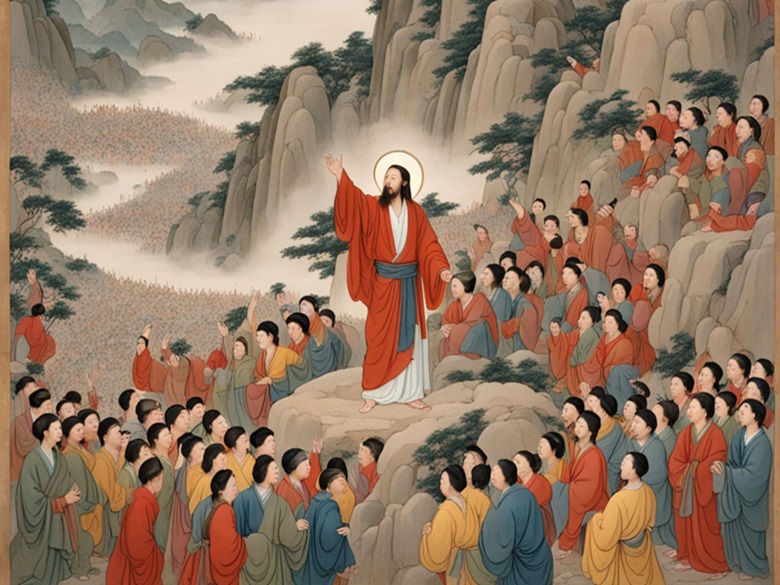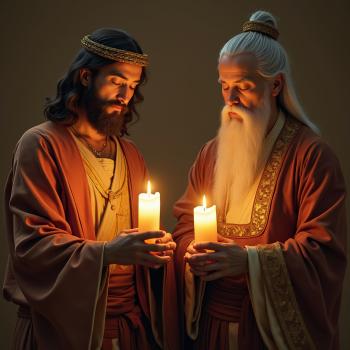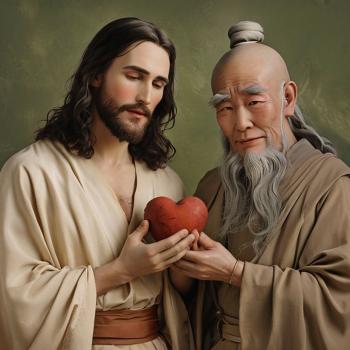If Jesus and Lao Tzu endorsed a candidate, they would be humble, kind, and without rapacity. Someone who leads by doing nothing at all.

Jesus and Lao Tzu’s leadership style looks quite different from the power-hungry brand that the world values. Religious, political, business, social, and other kinds of front-runners would do well to follow the leadership style of these two masters of the Way of humility.
Tao Te Ching, Verse 3, J.H. McDonald Translation
If you overly esteem talented individuals,
people will become overly competitive.
If you overvalue possessions,
people will begin to steal.
Do not display your treasures
or people will become envious.
The Master leads by
emptying people’s minds,
filling their bellies,
weakening their ambitions,
and making them become strong.
Preferring simplicity and freedom from desires,
avoiding the pitfalls of knowledge and wrong action.
For those who practice not-doing,
everything will fall into place.
The third verse of Lao Tzu’s Tao Te Ching contrasts two opposing types of leaders. First is the “talented individual,” and second is the “master.” The talented individual impresses people to gain a following, while the one who develops mastery of the Way helps people to live by the Tao.
Each Followed Their Own Way
In the Book of Judges, when the Israelites settle in Canaan, no king governs the people. Everyone does as they see fit. Or, as some have translated, “Each followed their own Way (Tao).” This isn’t a bad thing. Rather than interpreting this as a time of anarchy, we might see it as everyone following the Way of their own spiritual connection to the divine Source. Instead of a king, the loose confederation of tribes finds its leadership in women and men gifted to lead, rather than their neighbors’ patriarchal and hereditary monarchic systems.
“Give Us a King!”
Yet, because the people feel inadequate following the Way without a leader, they cry out for a king. So begins the search for a talented, impressive leader. When Israel crowns its first monarch, Saul certainly fits the bill. He is tall and handsome, demanding loyalty, praise, fealty, and taxes. It’s like a deal with the devil: people get what they want—with a cruel twist. When they subject themselves to this new ruler, the people become ineffective. They relinquish their power to a monarch jealous of any competition. Because he overvalues his throne, Saul eventually attempts to murder David. This results in war, and in time, David wins the king’s crown.
David proves no more righteous than his predecessor Saul. In fact, in many ways, he shows himself to be worse. David values his many possessions and considers women as part of that collection. In his sexual conquests, he treats women as possessions to be won or stolen. He ravages Bathsheba and murders her husband Uriah to cover-up the resulting pregnancy. David’s family begins to fall apart—a steady decline that ends in rape and incest, rebellion, murder, and civil war. All this originates with people overly esteeming talented leadership and treasure.
Jesus’ Style of Leadership
Jesus stands in sharp contrast to this style of leadership. Though people call him the Son of David, Jesus knows he must take a different Path from his ancestor. Jesus does not lead as royalty does, filling people’s minds with pomp, pageantry, and wealth to make them envious. Instead, he guides by helping people clear their minds of such distractions and teaching them to simplify their souls. Jesus does not lead as the priests and religious teachers, adding expectations of increasing righteousness. Instead of piling on perfectionism, Jesus leads by subtraction—reducing his requirements to two: loving God and loving people. This, he says, fulfills the entire law and the prophets.
Leadership That Is Indifferent to Power
As a teacher of the Way in the style of Lao Tzu’s Tao Te Ching, Jesus leads by taking care of the people’s basic needs. He heals their bodies and casts out evil spirits. He fills their hungry bellies. He teaches them to be content with simple things, detaching themselves from cravings. Jesus says:
“Therefore I tell you, do not worry about your life, what you will eat or what you will drink, or about your body, what you will wear. Is not life more than food and the body more than clothing? Look at the birds of the air: they neither sow nor reap nor gather into barns, and yet your heavenly Father feeds them. Are you not of more value than they? And which of you by worrying can add a single hour to your span of life? And why do you worry about clothing? Consider the lilies of the field, how they grow; they neither toil nor spin, yet I tell you, even Solomon in all his glory was not clothed like one of these. But if God so clothes the grass of the field, which is alive today and tomorrow is thrown into the oven, will he not much more clothe you—you of little faith? Therefore do not worry, saying, ‘What will we eat?’ or ‘What will we drink?’ or ‘What will we wear?’ For it is the gentiles who seek all these things, and indeed your heavenly Father knows that you need all these things.
Jesus said that the necessary manifestations of the world will be added to you if you first seek the heavenly realm and divine Virtue. This is true of physical possessions, but it also applies to power and prestige. Jesus wants his disciples to be indifferent to their own desires for supremacy and celebrity. He teaches that leaders must become servants and that the last will be the first.
Jockeying for Position
The Gospel of Mark relates one such story, where Jesus rebukes his disciples for jockeying with one another for position:
James and John, the sons of Zebedee, came forward to him and said to him, “Teacher, we want you to do for us whatever we ask of you.” And he said to them, “What is it you want me to do for you?” And they said to him, “Appoint us to sit, one at your right hand and one at your left, in your glory.” But Jesus said to them, “You do not know what you are asking. Are you able to drink the cup that I drink or be baptized with the baptism that I am baptized with?” They replied, “We are able.” Then Jesus said to them, “The cup that I drink you will drink, and with the baptism with which I am baptized you will be baptized, but to sit at my right hand or at my left is not mine to appoint, but it is for those for whom it has been prepared.”
When the ten heard this, they began to be angry with James and John. So Jesus called them and said to them, “You know that among the Gentiles those whom they recognize as their rulers lord it over them, and their great ones are tyrants over them. But it is not so among you; instead, whoever wishes to become great among you must be your servant, and whoever wishes to be first among you must be slave of all. For the Son of Man came not to be served but to serve…
God Chooses the Foolish, Weak, & Low
Lao Tzu writes about “avoiding the pitfalls of knowledge and wrong action.” Likewise, Jesus teaches simplicity to the point of foolishness as a Way of Virtue. The apostle Paul comments on this when he writes:
“…God chose what is foolish in the world to shame the wise; God chose what is weak in the world to shame the strong; God chose what is low and despised in the world, things that are not, to abolish things that are, so that no one might boast in the presence of God.”
Jesus’ Way of humility confuses those who trust in their own strength and knowledge. Time and again his life and teachings baffle religious leaders. Jesus makes their wisdom seem foolish. His is the truth that they cannot comprehend. Theirs is a way of striving after righteousness, but Jesus practices Non-Doing and Non-Striving.
Jesus, the Lord of Rest
The third stanza of Lao Tzu’s Tao Te Ching concludes, “For those who practice not-doing, everything will fall into place.” Jesus so identifies with the spirit of wu-wei (the Taoist concept of doing without striving) that he called himself the “Lord of the Sabbath.” The English word “sabbath” comes from the Hebrew shavat, “to rest.”
It’s interesting, then, that the Lord of Rest so frequently gets caught working on the Sabbath. By this, Jesus demonstrates how to work in a restful Way and rest productively. Rest and work are the Yin and Yang that make up the whole Way of life. Action should be done out of a place of wu-wei, or Non-Action. By practicing Non-Doing, everything gets done. By working on the Sabbath, Jesus shows us how to make work an activity born out of rest.
Which Style of Leadership?
Essentially, there are two types of leadership. You can support and emulate a leadership style based on clutching for power, manipulating others, and hoarding treasures. Or you can adopt a leadership method modeled after Lao Tzu and Jesus’s restful approach. The latter emphasizes simplicity, freedom from grasping, humility, and respect. The choice is obvious to the eternally-minded person. But is it obvious to the world?
Something to Pray…
Jesus, you who put yourself last so that others could be first, help me to lead as you lead. May I follow your example in choosing those whom humans esteem to be weak, foolish, and low. Instead of promoting myself, may I amplify the voices of the marginalized to that their story is heard. Lord of Rest, I take refuge in you, my who are my Sabbath.














